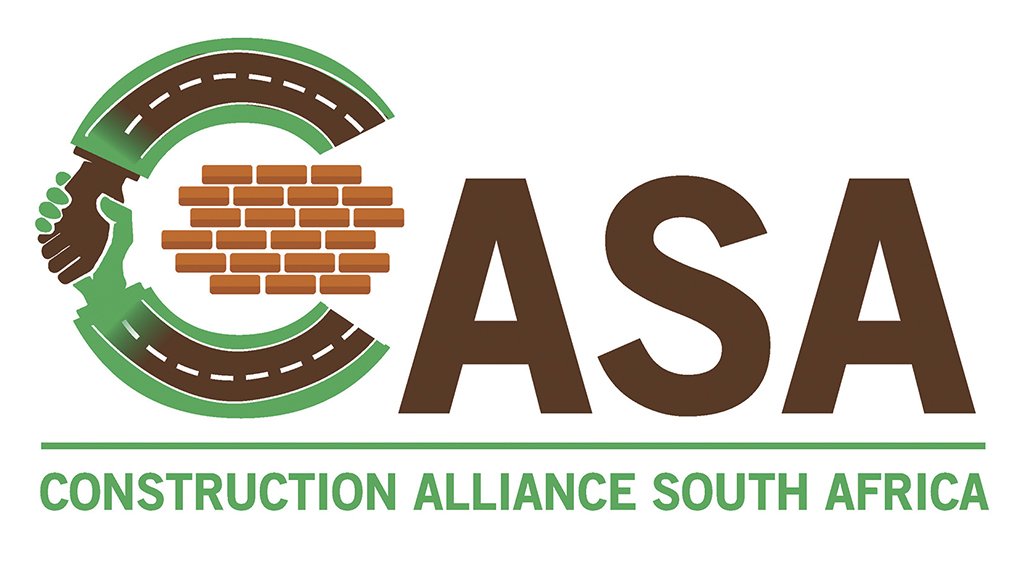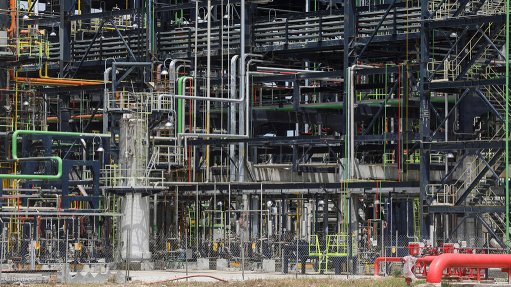CASA, industry participants highlight construction’s crucial role in economic development
Construction and infrastructure development can play a direct role in stimulating an economic turnaround and providing employment, while also being one of the most effective ways of stimulating growth, various construction sector experts said at a virtual conference hosted by Construction Alliance South Africa (CASA). The webinar was sponsored by RIB CCS and AfriSam.
CASA deputy chairperson, Black Business Council (BBC) VP and BBC in the Built Environment CEO Gregory Mofokeng said infrastructure development was central to the implementation of South Africa’s Economic Reconstruction and Recovery Plan (ERRP).
“This is simply because of the significant contribution the construction industry plays in terms of economic growth and employment creation. Additionally, improving the implementation of the Expanded Public Works Programme can help to dramatically increase the employment of all infrastructure development programmes.
“The country is in dangerous territory as far as unemployment is concerned and this situation is unacceptable. As a construction industry, we have a role to play in ensuring the country can reduce the high unemployment rate in partnership with government as it implements the ERRP.”
One of the central tenants of the ERRP is to ensure private sector investment is brought in, as financing cannot be sourced from the national fiscus alone. The national fiscus is taking strain owing to the low levels of economic activity and the private sector must be allowed to help fund infrastructure development into the future, Mofokeng asserted.
CASA is a construction sector umbrella body comprising 36 construction sector industry organisations with a mandate to address long-standing industry issues, including accelerating transformation and protection against subsidised foreign competition, combating corruption and unethical practices and to contribute to a healthy and sustainable industry, Mofokeng pointed out.
“There are some challenges that all stakeholders in the industry face. Some of them include the slow tender awarding processes. CASA hopes government will ensure the process to award tenders is expedited in line with the central role construction is meant to play in the ERRP.
Other significant challenges for the industry include the cancellation of tenders, delayed payments and job losses, with the industry still experiencing job shedding across the value chain.
Tackling Challenges
Bureau for Economic Research (BER) senior economist Craig Lemboe, mean-while, told conference participants that the industry had needed an umbrella formation, such as CASA, to tackle the challenges the industry is facing in a united manner.
To determine the role construction can play in the economic recovery of South Africa, it is important to understand the interlinkages between the construction sector and development, which forms a virtuous cycle that constantly ebbs and flows to the benefit of the sector and the economy.
Economists use a theoretical concept called potential growth to examine what growth rates an economy can sustain without excessive inflation. Much of this approach is formed around the concept of resource dependency – that is, how much resources an economy has available in terms of labour, raw materials and capital to determine how fast an economy can grow, explained Lemboe.
Potential Growth
South Africa’s potential growth rate has gradually eased over the past few years, from around 2.5% to 3.5% a decade ago, to only 0.3% in 2019. These concepts are important to consider when the economy starts to recover, as the realised growth rate may be limited if capacity is not expanded to allow the economy to expand at an accelerated pace.
“The role of the construction sector is not only in contributing to growth directly, but in its ability to enhance the economy’s capacity to grow. More capital and more infrastructure enhance the capacity of the economy to grow.”
Investment in energy generation and providing a reliable energy supply to manufacturing, mining and households will increase investor interest in manufacturing, mining and residential projects, he illustrated.
The BER’s July forecast, for example included, tentatively, the impact of the amendment of Schedule 2 of the Electricity Regulation Act that raised the licensing-exemption threshold for embedded generation to 100 MW and the faster rollout of the renewable energy programme. With these, along with other important assumptions, the country’s potential growth rate increased to around 2% in the medium term, he noted.
However, this intervention could only contribute to higher levels of growth if the construction sector builds and manages these projects, said Lemboe.
“The investment target of R2.3-trillion by 2030, as determined by the Sustainable Infrastructure Development Symposium (SIDS), is large and needs a construction industry that is effective, efficient and capable of handling the infrastructure investment proposed.”
The recently released National Infrastructure Plan (NIP) has proposed that more than R6-trillion is needed to achieve the National Development Plan targets for economic and social infrastructure.
Additionally, the construction sector has a significant role to play in terms of employment. It employs about 9.5% of the total workforce of the country (excluding agriculture) and efforts to create employment in the construction sector are likely to provide more jobs relative to comparable efforts in other sectors of the economy, said Lemboe.
Rebuilding
Meanwhile, the construction industry plays a critical role in any country for recovery, rebuilding and development, said Altman Advisory director Professor Miriam Altman, who was also a national planning commissioner and is the lead drafter of the NIP 2050.
“Construction plays a role in stimulating the economy directly. It also has multiplier effects through its extensive supplier base. This will happen through major infrastructure but also if building projects such as housing take off. Maintenance is also a critically important activity to stimulate economic activity while also lengthening the life span of infrastructure and improving value for money in public investment,” she said.
The NIP also speaks to transparent reporting, which is critical to facilitate delivery, she noted.
“We want to see transparent reporting of the project pipeline and the tenders, which companies won tenders and project progress. Transparent reporting is key to ensure accountability and success of the project pipeline,” said Altman.
Importantly, Cabinet required the NIP planning team to develop a clear three-year plan to strengthen regulatory and institutional capacity before it was released. The NIP will give significant clarity on infrastructure spending, especially in relation to the Strategic Infrastructure Projects (SIPs), she said.
CASA chairperson and Garden Cities Group CEO John Matthews said the issues referred to in the NIP 2050 are important from a public and private enterprise perspective, especially the conditions required for infrastructure spending.
The State must operationalise the procurement management process for certainty and confidence and the regulatory framework must be streamlined. Concerted effort from local, provincial and national government spheres is needed to ensure the regulatory framework encourages investment and economic growth, he added.
Investment Decline
Meanwhile, the pace of infrastructure development in South Africa has fallen. The Accelerated and Shared Growth Initiative for South Africa, introduced in 2004, aimed to boost infrastructure investment to 25% of GDP.
Infrastructure investment as a percentage of GDP peaked at 18% at the time of the soccer World Cup in 2010, but has since declined significantly, said financial services group Nedbank Economic Unit senior economist Isaac Matshego.
The decline in infrastructure investment post-World Cup and the cutting back of infrastructure spending had a negative impact on economic growth.
“We need to catch up with infrastructure development. Various issues hobble infrastructure investment to again get the construction sector to contribute to economic growth. We need to find innovative ways of financing projects.
“We need to promote the user-pays principle in South Africa. However, this is a political hot potato as consideration must be given to who can pay to access infrastructure. Further, there is low confidence in public officials, so making gains on the governance front and improving business and consumer confidence will help to improve the level of payment.
“We are behind in our development. Infrastructure development has been delayed in South Africa and we have infrastructure crumbling in some municipalities. Until we address this specific issue, we will not support any willingness to pay for the advantage of higher-value assets under the NIP,” he added.
Industry body Consulting Engineers South Africa (CESA) CEO Chris Campbell echoed the sentiments proffered by the other speakers, saying the time had come for the construction industry’s role in and importance to the economy to be recognised.
“We need to start exerting the voice we have as business, and jointly work with other industry and business organisations, such as Business Unity South Africa and BBC, and join hands to be regarded as partners, rather than wait for government to decide when and how infrastructure planning and delivery will happen as has been the practice in the past.”
He further noted that, if as a country we do not urgently address our economic challenges that hamper our ability to deal with critical social ills, notably unemployment and poverty as well as be serious about rooting out corruption, we are likely to experience a repetition of events, such as those that we witnessed just over a month ago in KwaZulu-Natal and Gauteng.
For more information about CASA, please email info@constructionalliancesa.org.za.
Article Enquiry
Email Article
Save Article
Feedback
To advertise email advertising@creamermedia.co.za or click here
Press Office
Announcements
What's On
Subscribe to improve your user experience...
Option 1 (equivalent of R125 a month):
Receive a weekly copy of Creamer Media's Engineering News & Mining Weekly magazine
(print copy for those in South Africa and e-magazine for those outside of South Africa)
Receive daily email newsletters
Access to full search results
Access archive of magazine back copies
Access to Projects in Progress
Access to ONE Research Report of your choice in PDF format
Option 2 (equivalent of R375 a month):
All benefits from Option 1
PLUS
Access to Creamer Media's Research Channel Africa for ALL Research Reports, in PDF format, on various industrial and mining sectors
including Electricity; Water; Energy Transition; Hydrogen; Roads, Rail and Ports; Coal; Gold; Platinum; Battery Metals; etc.
Already a subscriber?
Forgotten your password?
Receive weekly copy of Creamer Media's Engineering News & Mining Weekly magazine (print copy for those in South Africa and e-magazine for those outside of South Africa)
➕
Recieve daily email newsletters
➕
Access to full search results
➕
Access archive of magazine back copies
➕
Access to Projects in Progress
➕
Access to ONE Research Report of your choice in PDF format
RESEARCH CHANNEL AFRICA
R4500 (equivalent of R375 a month)
SUBSCRIBEAll benefits from Option 1
➕
Access to Creamer Media's Research Channel Africa for ALL Research Reports on various industrial and mining sectors, in PDF format, including on:
Electricity
➕
Water
➕
Energy Transition
➕
Hydrogen
➕
Roads, Rail and Ports
➕
Coal
➕
Gold
➕
Platinum
➕
Battery Metals
➕
etc.
Receive all benefits from Option 1 or Option 2 delivered to numerous people at your company
➕
Multiple User names and Passwords for simultaneous log-ins
➕
Intranet integration access to all in your organisation

























